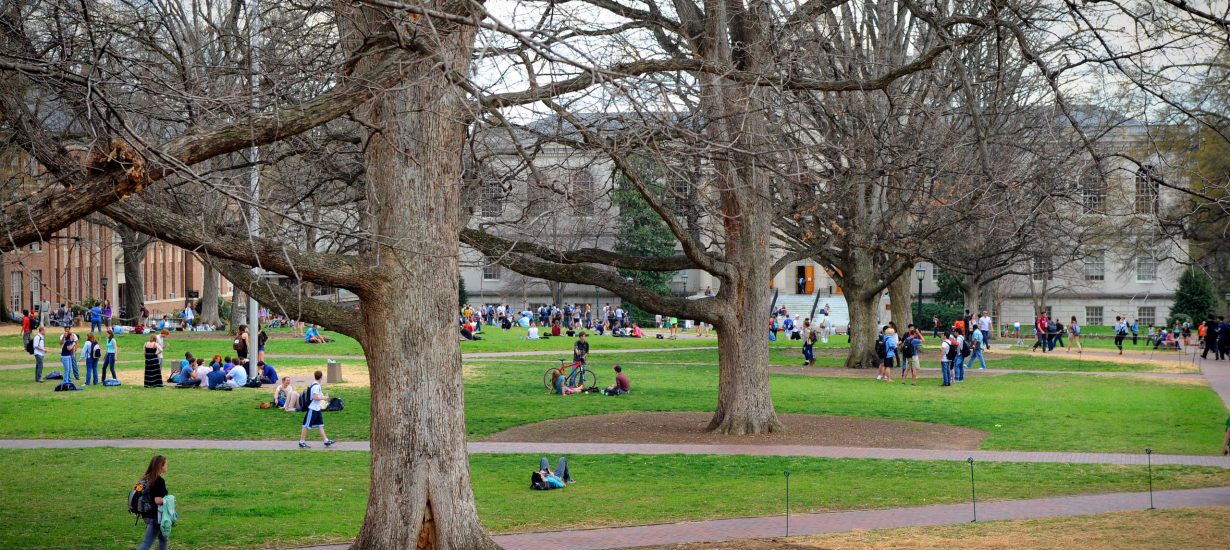Students Say They Are Committed to Free Expression

Carolina students for the most part don’t believe their professors push political agendas or try to censor them in the classroom, but they say they do fear negative reactions from their classmates if they voice an opinion, according to a panel discussion that included four UNC undergraduates.
Nathan Gibson, a senior political science major who identifies as conservative, said he doesn’t think Carolina professors push political agendas, although students may infer underlying ideologies.
“I think overall they do a good job of encouraging discussion from all sides of the spectrum,” Gibson said. “I think the chief problem comes from campus culture, as sad as that is.”
Gibson was part of a group of four students taking part in a Sept. 13 discussion titled “Can We Talk? Student Thoughts on Free Expression at UNC,” co-sponsored by the Program for Public Discourse and the political science department. The panel was organized to discuss findings in a survey of eight UNC System universities titled “Free Expression and Constructive Dialogue in the University of North Carolina System,” which was released in June.
Among its findings, the survey reported that 83 percent of UNC students who self-identify as conservative worried about their peer’s opinions if they expressed an opinion in class — the highest percentage among all schools in the report. For students who self-identify as liberal, 24 percent said they were concerned about voicing opinions compared with 40 percent of moderates. At all eight schools in the survey, “self-identified conservatives express free-expression-related concerns at a far higher rate than self-identified liberals,” according to the survey.
Gibson is editor-in-chief of Carolina Review, a student-run, conservative and libertarian publication. He discussed frequent vandalism of some boxes holding Review newspapers, as well as what he called close-mindedness and stereotypes aimed at Republican students.
“I think that that does permeate our campus discourse,” Gibson said. “I don’t know how large of an extent but enough of an extent for people to generate a real fear of speaking their mind authentically, which, in my opinion, is really the chief purpose of college — to be able to speak what your opinions are, however stupid or however bright they may be, duke it out with other people who disagree with you and at the end of the day be a more informed, more intelligent person.”
Gibson was the lone conservative on the panel, which included junior Aidan Buehler, a philosophy and economics major; senior Cho Nikoi, a history major; and sophomore Maddux Vernon, who is double majoring in political science and peace, war and defense. The 90-minute session was held in Fetzer Hall.
“I grew up at the dinner table learning to have discussions and how to articulate my thoughts in such a way that wouldn’t offend someone else,” said Vernon, the daughter of political science professors. Engaging in public discourse with those with whom she disagrees has made her a better critical thinker, speaker, debater and person, she said.
Nikoi said she enjoys meeting people and hearing their viewpoints, even when they don’t mirror hers. “I think it’s a good exercise and helps you get better with your critical thinking skills or your ability to prevent an argument,” she said.
Nikoi said she became aware of the issue of cultural restrictions on personal speech around the time of the 2016 presidential election. “There was heightened discourse about feelings of safety, feelings of whatever you want to call it, in the liberal space I was in at a boarding school in Massachusetts,” she said.
Buehler said when he was in high school he identified as conservative and had “first-hand experience being an ideological outlier, in some instances a pariah.”
He said he’s committed to free expression. “I enjoy exchanging ideas with people I disagree with,” Buehler said. “It’s extremely stimulating, exciting and important, too. I think, for the vast, vast majority of people, your upbringing, your psychological temperament, almost everything that determines what you believe is outside of your control, so given that, I think that leads to a need for an encouraging, empathetic and understanding approach to people with whom you disagree.”
According to the free expression survey, 35 percent of UNC respondents overall said they were most concerned about their peers’ reactions if they expressed their sincere opinions in the classroom. That led other concerns such as the instructor’s opinion (24 percent), social media (22 percent), how it may affect their grade (15 percent), and code of conduct (13 percent).
The 24 percent of Carolina students saying they were concerned about their instructor’s opinion was the highest of all schools; the lowest percentage was N.C. Central University students at 13 percent.
McNeilly said given the survey’s findings, the University should determine ways to encourage free expression and constructive dialogue campuswide.
“I know the chancellor and the provost and a number of the faculty are interested in doing that,” McNeilly said. “I’m not speaking for the University, but it’s my view that University leadership is committed to it.”
— Laurie D. Willis ’86
